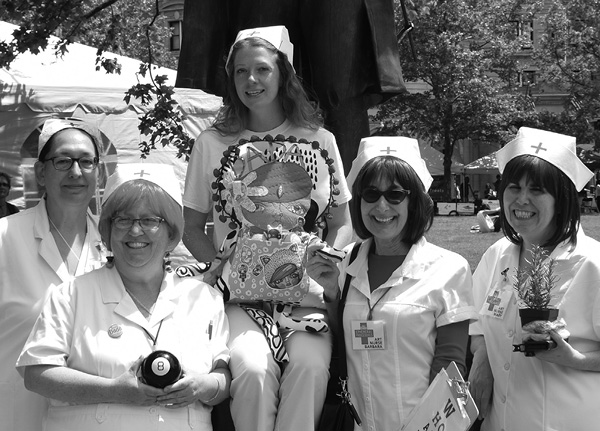
EPHEMERAL PROCEDURES
first performed on June 5, 2018
Boston Public Market, 100 Hanover St, Boston, MA
performed five times in 2018
DAY DE DADA PERFORMANCE ART COLLECTIVE
Mary Campbell, Lydia Grey, Barbara Lubliner, Farrell Mason Brown, Vivian Vassar
Staten Island, NY / Manhattan, NY / Brooklyn, NY / Somerville, NJ
536199918d536199918a536199918y536199918d536199918e536199918d536199918a536199918d536199918a536199918@536199918y536199918a536199918h536199918o536199918o536199918.536199918c536199918o536199918m
daydedada.com
EPHEMERAL PROCEDURES
DAY DE DADA PERFORMANCE ART COLLECTIVE
Day de Dada Art Nurses spent the first week of June performing “Ephemeral Procedures” in farmers markets throughout Boston, providing individual art health procedures to open-minded voluntary patients. Nurses diagnosed and prescribed with a Magic 8 Ball, with tarot cards and palm reading, by giving third eye exams, art divining with vegetables, and having people take a breath of the aroma of a rosemary plant. Dressed in the white nurse dresses and caps traditional to the twentieth century, and in bright-colored wigs, the performers were already a spectacle.
Mobius Art Group suggested the public venues, gave advice on the limits we had to approach people in each space, and accompanied us to document the performances in their online Dadabloge.
Each nurse would approach people who looked interested and explain their art health procedure. Then if the person was captivated the nurse would examine and diagnose them. We considered ahead of time the action of approaching people without permission of the market and we were sensitive to facial and body language and not insistent if anyone negatively responded.
The first performance event was at an indoor market on a very rainy day and many of the people there were office workers ducking in for lunch and did not want to take the time to interact with us, but we did find some who were curious enough to get their diagnoses. Lots of explaining to people what we were doing and getting rejected occurred, but through perseverance we were able to have many successful interactions.
Our methods were created to help people explore their creative potential or see their mental or physical health from another perspective. We use the roles of medical nurses as caregivers, observers and teachers and cull from modern and alternative medical procedures. Public “patients” connect to the actions since most people are concerned with some aspect of their health and curious about alternative suggestions, and of course insecure in a time when access to health care has become possibly fragile.